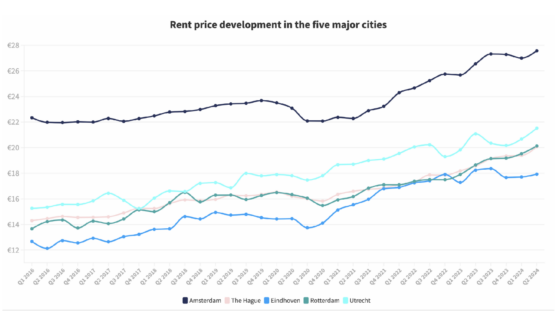Rental housing supply plunges while rents for new contracts soar
Robin Pascoe
The number of rental homes not covered by strict income rules has plunged by a third on a year ago, while rents for new contracts are up almost 10%, according to new research by housing platform Pararius.
The drop means home hunters using the Pararius website have almost 7,000 fewer rental properties to choose from than they did a year ago, leading to a sharp rise in prices. On average, tenants now pay €18.79 per square metre for a rental property, but in Amsterdam, for example, average rents rose by 3.8% to €27.57 per square metre.
In The Hague and Rotterdam new contract rents were up 8%, while in Utrecht the increase was 2.1%. In Eindhoven, by contrast, rental homes offered via the Pararius website became marginally cheaper in the second quarter, when compared with a year ago.
The decline in the number of homes and the rise in prices is a continuation of recent trends and underscores the ongoing pressure on the rental market.
Almost 8% of properties up for sale in the second quarter were previously rented out via the Pararius website, up from 7% in the first quarter, the housing agency said. This is largely down to new government regulations which make it less attractive for landlords to rent out smaller homes in particular.

From July 1 rent controls have been increased to cover 90% of the rental market, while the taxes paid by landlords are also going up. Two-year contracts, which landlords commonly used, have also been banned.
“This was expected to happen and now it clearly is,” Pararius chief executive Jasper de Groot told Dutch News. “We and lots of other organisations, including the Council of State, have been warning about this. They all told the government ‘don’t do it’.”
What the new rent controls in the Netherlands mean for you
Landlords, De Groot said, are waiting until tenants leave a property and then deciding what is the best thing to do financially. “Landlords have a choice and they are making it,” he said.
The new rent controls and ban on short leases, however, may be an advantage to traditional expats, he said. “They will be chosen for a property above a Dutch person because 90% of them will move on after three years. They also have more money to spend on rent.”
Thank you for donating to DutchNews.nl.
We could not provide the Dutch News service, and keep it free of charge, without the generous support of our readers. Your donations allow us to report on issues you tell us matter, and provide you with a summary of the most important Dutch news each day.
Make a donation